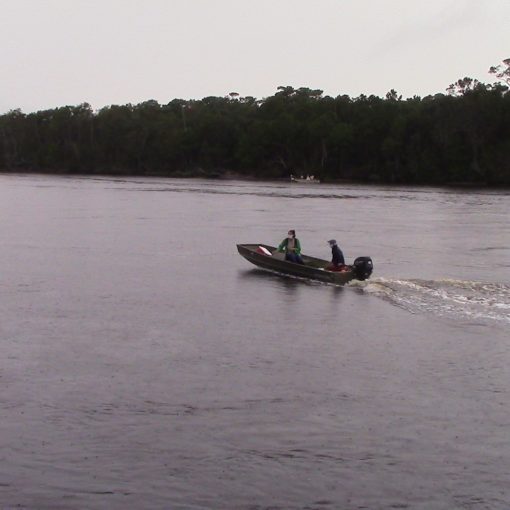
Duke Superfund Center’s CEC seeks to increase understanding, inform decision-making, and ultimately change behavior related to exposure to contaminants in fish, particular mercury and PCBs, among subsistence fish consumers in the Northeast Cape Fear River, with a special emphasis on reducing early life or developmental exposures for children and pregnant women. This is the first of three posts on the CEC’s fish consumption project. Stay tuned to learn more about how how work is progressing.
By Steven Yang
On February 1st, the CEC traveled to Wilmington, North Carolina to lead a final meeting for a community-based educational campaign for subsistence fish consumers who live near the Cape Fear River. We met with partner organizations and community members to celebrate our accomplishments, reflect on lessons learned so far, and plan a successful close-out process for the work, which was funded by an EPA collaborative grant.
The project aims to help subsistence fish consumers reduce their exposure to contaminants such as mercury and PCBs in fish. We are collaborating with a group of community organizations that were awarded an EPA Environmental Justice Collaborative Problem-Solving Grant in 2016 to conduct a household survey of subsistence fish consumers. The group used the survey results to craft an education and outreach campaign, called “Stop, Check, and Enjoy,” focused on changing individual behaviors to prevent or reduce exposure to mercury in fish, particularly among vulnerable populations such as pregnant women and children. The slogan for the campaign refers to checking local fish consumption advisories and choosing to enjoy fish that are known to be lower in mercury and other contaminants.

The fall-winter 2017 household survey was led by researchers from the Wake Forest School of Medicine and implemented by Cape Fear River Watch and locally-recruited community data collectors. The survey yielded information about commonly eaten fish species, common preparation methods, and demographic information (income, food security status, etc.). At the meeting, we highlighted these results and others to the partner organizations and community members.
Next, the group will expand outreach efforts with more materials, community events, and ultimately, a final community event to share results with the broader community and set the stage for a sustainable effort to continue educating and empowering community members to choose safer fish from the Cape Fear River.
The group is collaboratively developing a promotional calendar with recipes that using lower-mercury fish options, developed in partnership with local Wilmington chefs. The recipes will also offer delicious alternatives to frying fish that can help to minimize exposure to some contaminants. Even after the final event in May 2019, the CEC will continue our work with community partners to share this important information and work towards reducing exposures and promoting public health.
We would like to thank the community collaborators who attended this meeting and who have taken part in the campaign so far:
- U.S. EPA (project grant maker)
- Cape Fear River Watch (primary EPA grantee)
- New Hanover County NAACP (EPA grant partner)
- New Hanover County Health Department (EPA grant partner)
- Duke University Environmental Law and Policy Clinic (EPA grant partner)
- Wake Forest School of Medicine (EPA grant partner)
- Veronica Carter – Coastal Federation and Southeast EJ organizer (community supporter)
- Ashley Daniels – Southeast Environmental Justice organizer (community supporter)
- Savorez Restaurant (community supporter)
- PinPoint Restaurant (community supporter)
- Catch Restaurant (community supporter)
- New Hanover County Parks & Gardens (community supporter)






